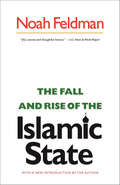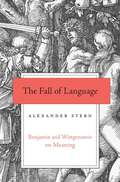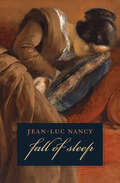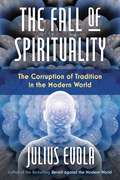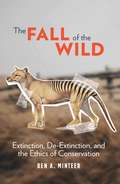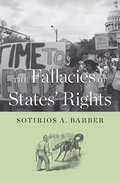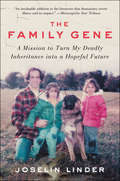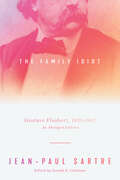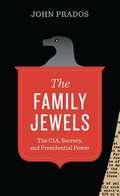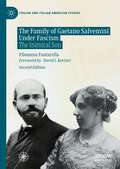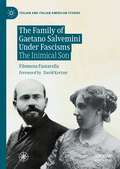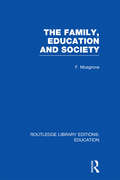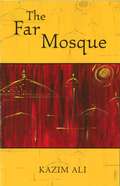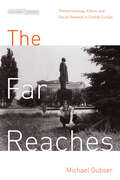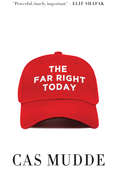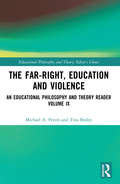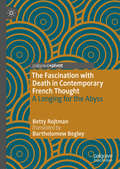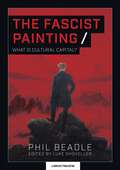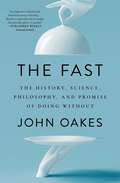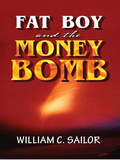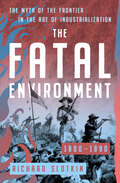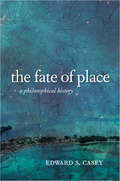- Table View
- List View
The Fall and Rise of the Islamic State
by Noah FeldmanPerhaps no other Western writer has more deeply probed the bitter struggle in the Muslim world between the forces of religion and law and those of violence and lawlessness as Noah Feldman. His scholarship has defined the stakes in the Middle East today. Now, in this incisive book, Feldman tells the story behind the increasingly popular call for the establishment of the shari'a--the law of the traditional Islamic state--in the modern Muslim world. Western powers call it a threat to democracy. Islamist movements are winning elections on it. Terrorists use it to justify their crimes. What, then, is the shari'a? Given the severity of some of its provisions, why is it popular among Muslims? Can the Islamic state succeed--should it? Feldman reveals how the classical Islamic constitution governed through and was legitimated by law. He shows how executive power was balanced by the scholars who interpreted and administered the shari'a, and how this balance of power was finally destroyed by the tragically incomplete reforms of the modern era. The result has been the unchecked executive dominance that now distorts politics in so many Muslim states. Feldman argues that a modern Islamic state could provide political and legal justice to today's Muslims, but only if new institutions emerge that restore this constitutional balance of power.The Fall and Rise of the Islamic State gives us the sweeping history of the traditional Islamic constitution--its noble beginnings, its downfall, and the renewed promise it could hold for Muslims and Westerners alike. In a new introduction, Feldman discusses developments in Egypt, Tunisia, Libya, and other Muslim-majority countries since the Arab Spring and describes how Islamists must meet the challenge of balance if the new Islamic states are to succeed.
The Fall of Language: Benjamin and Wittgenstein on Meaning
by Alexander SternKnown for his essays on culture, aesthetics, and literature, Walter Benjamin also wrote on the philosophy of language. For Alexander Stern, his famously obscure—and, for some, hopelessly mystical—early work contains important insights, anticipating and in some respects surpassing Wittgenstein’s later thinking on the philosophy of language.
The Fall of Sleep
by Jean-Luc NancyPhilosophers have largely ignored sleep, treating it as a useless negativity, mere repose for the body or at best a source for the production of unconscious signs out of the night of the soul.In an extraordinary theoretical investigation written with lyric intensity, The Fall of Sleep puts an end to this neglect by providing a deft yet rigorous philosophy of sleep. What does it mean to "fall" asleep? Might there exist something like a "reason" of sleep, a reason at work in its own form or modality, a modality of being in oneself, of return to oneself, without the waking "self" that distinguishes "I" from "you" and from the world? What reason might exist in that absence of ego, appearance, and intention, in an abandon thanks to which one is emptied out into a non-place shared by everyone?Sleep attests to something like an equality of all that exists in the rhythm of the world. With sleep, victory is constantly renewed over the fear of night, an a confidence that we will wake with the return of day, in a return to self, to us--though to a self, an us, that is each day different, unforeseen, without any warning given in advance.To seek anew the meaning stirring in the supposed loss of meaning, of consciousness, and of control that occurs in sleep is not to reclaim some meaning already familiar in philosophy, religion, progressivism, or any other -ism. It is instead to open anew a source that is not the source of a meaning but that makes up the nature proper to meaning, its truth: opening, gushing forth, infinity.This beautiful, profound meditation on sleep is a unique work in the history of phenomenology--a lyrical phenomenology of what can have no phenomenology, since sleep shows itself to the waking observer, the subject of phenomenology, only as disappearance and concealment.
The Fall of Spirituality: The Corruption of Tradition in the Modern World
by Julius Evola• Examines newer spiritual &“systems&” of the modern era, from spiritism and theosophy, to parapsychic research and anthroposophism, to psychoanalysis and the Church of Satan • Compares these newer spiritual &“systems&” to the traditional spiritual path of the ancients and exposes the misunderstandings, misinterpretations, and occult dangers lurking in their practices • Also examines important modern figures such as Nietzsche, Aleister Crowley, Rudolf Steiner, Dostoevsky, Freud, Jung, Gurdjieff, Krishnamurti, and Anton LaVey Written two years before his most prominent book Revolt Against the Modern World, Julius Evola&’s The Fall of Spirituality was originally published in Italian as Maschera e volto dello spiritualismo contemporaneo (The Mask and Face of Contemporary Spiritualism). In it, the Baron critiques the spiritual schools, cults, philosophies, and mystical teachers of the 20th century--from spiritism and theosophy, to parapsychic research and anthroposophism, to psychoanalysis and the Church of Satan--comparing these newer spiritual &“systems&” to the traditional spiritual path of the ancients and exposing the misunderstandings, misinterpretations, and occult dangers lurking in their practices. Examining important modern figures such as Nietzsche, Aleister Crowley, Rudolf Steiner, Dostoevsky, Freud, Jung, Gurdjieff, Krishnamurti, and Anton LaVey, the author contends that their aspirations to power are limited to a focus on concerns of the mundane world. They are thereby blind to the existence of a supernatural reality that offers individuals transmutation from the fallen human personality into a semigod-like status--a status attainable only by those who can master the rigors demanded of initiates on the traditionalist path. Offering an essential guidebook for serious spiritual seekers looking for a more profound metaphysical discipline than those of the spiritual schools of the modern era, Evola also provides contrasting insights from the age-old path of initiation and high magic.
The Fall of the Wild: Extinction, De-Extinction, and the Ethics of Conservation
by Ben A. MinteerThe passenger pigeon, the great auk, the Tasmanian tiger—the memory of these vanished species haunts the fight against extinction. Seeking to save other creatures from their fate in an age of accelerating biodiversity loss, wildlife advocates have become captivated by a narrative of heroic conservation efforts. A range of technological and policy strategies, from the traditional, such as regulations and refuges, to the novel—the scientific wizardry of genetic engineering and synthetic biology—seemingly promise solutions to the extinction crisis.In The Fall of the Wild, Ben A. Minteer calls for reflection on the ethical dilemmas of species loss and recovery in an increasingly human-driven world. He asks an unsettling but necessary question: Might our well-meaning efforts to save and restore wildlife pose a threat to the ideal of preserving a world that isn’t completely under the human thumb? Minteer probes the tension between our impulse to do whatever it takes and the risk of pursuing strategies that undermine our broader commitment to the preservation of wildness. From collecting wildlife specimens for museums and the wilderness aspirations of zoos to visions of “assisted colonization” of new habitats and high-tech attempts to revive long-extinct species, he explores the scientific and ethical concerns vexing conservation today. The Fall of the Wild is a nuanced treatment of the deeper moral issues underpinning the quest to save species on the brink of extinction and an accessible intervention in debates over the principles and practice of nature conservation.
The Fallacies of States' Rights
by Sotirios A. BarberThe idea that states’ rights restrain national power is riding high in American judicial and popular opinion. Here, Sotirios A. Barber shows how arguments for states’ rights, from the days of John C. Calhoun to the present, have offended common sense, logic, and bedrock constitutional principles. To begin with, states’ rights federalism cannot possibly win the debate with national federalism owing to the very forum in which the requisite argument must occur-a national one, thanks to the Civil War-and the ordinary rules of practical argumentation. Further, the political consequences of this self-defeating logic can only hasten the loss of American sovereignty to international economic forces. Both philosophical and practical reasons compel us to consider two historical alternatives to states’ rights federalism. In the federalism of John Marshall, the nation’s most renowned jurist, the national government’s duty to ensure security, prosperity, and other legitimate national ends must take precedence over all conflicting exercises of state power. In process federalism, the Constitution protects the states by securing their roles in national policy making and other national decisions. Barber opts for Marshall’s federalism, but the contest is close, and his analysis takes the debate into new, fertile territory. Affirming the fundamental importance of the Preamble, Barber advocates a conception of the Constitution as a charter of positive benefits for the nation. It is not, in his view, a contract among weak separate sovereigns whose primary function is to protect people from the central government, when there are greater dangers to confront.
The Family Gene: A Mission to Turn My Deadly Inheritance into a Hopeful Future
by Joselin LinderA riveting medical mystery about a young woman’s quest to uncover the truth about her likely fatal genetic disorder that opens a window onto the exploding field of genomic medicineWhen Joselin Linder was in her twenties her legs suddenly started to swell. After years of misdiagnoses, doctors discovered a deadly blockage in her liver. Struggling to find an explanation for her unusual condition, Joselin compared the medical chart of her father—who had died from a mysterious disease, ten years prior—with that of an uncle who had died under similarly strange circumstances. Delving further into the past, she discovered that her great-grandmother had displayed symptoms similar to hers before her death. Clearly, this was more than a fluke. Setting out to build a more complete picture of the illness that haunted her family, Joselin approached Dr. Christine Seidman, the head of a group of world-class genetic researchers at Harvard Medical School, for help. Dr. Seidman had been working on her family’s case for twenty years and had finally confirmed that fourteen of Joselin’s relatives carried something called a private mutation—meaning that they were the first known people to experience the baffling symptoms of a brand new genetic mutation. Here, Joselin tells the story of their gene: the lives it claimed and the future of genomic medicine with the potential to save those that remain. Digging into family records and medical history, conducting interviews with relatives and friends, and reflecting on her own experiences with the Harvard doctor, Joselin pieces together the lineage of this deadly gene to write a gripping and unforgettable exploration of family, history, and love. A compelling chronicle of survival and perseverance, The Family Gene is an important story of a young woman reckoning with her father’s death, her own mortality, and her ethical obligations to herself and those closest to her.
The Family Idiot: Gustave Flaubert, 1821–1857, An Abridged Edition
by Jean-Paul SartreAn approachable abridgment of Sartre’s important analysis of Flaubert. From 1981 to 1994, the University of Chicago Press published a five-volume translation of Jean-Paul Sartre’s The Family Idiot: Gustave Flaubert, 1821-1857, a sprawling masterwork by one of the greatest intellects of the twentieth century. This new volume delivers a compact abridgment of the original by renowned Sartre scholar, Joseph Catalano. Sartre claimed that his existential approach to psychoanalysis required a new Freud, and in his study of Gustave Flaubert, Sartre becomes that Freud. The work summarizes Sartre’s overarching aim to reveal that human life is a meaningful adventure of freedom. In discussing Flaubert’s work, particularly his classic novel Madame Bovary, Sartre unleashes a fierce critique of modernity as nihilistic and demeaning of human dignity.
The Family Idiot: Gustave Flaubert, 1821–1857, An Abridged Edition
by Jean-Paul SartreAn approachable abridgment of Sartre’s important analysis of Flaubert. From 1981 to 1994, the University of Chicago Press published a five-volume translation of Jean-Paul Sartre’s The Family Idiot: Gustave Flaubert, 1821-1857, a sprawling masterwork by one of the greatest intellects of the twentieth century. This new volume delivers a compact abridgment of the original by renowned Sartre scholar, Joseph Catalano. Sartre claimed that his existential approach to psychoanalysis required a new Freud, and in his study of Gustave Flaubert, Sartre becomes that Freud. The work summarizes Sartre’s overarching aim to reveal that human life is a meaningful adventure of freedom. In discussing Flaubert’s work, particularly his classic novel Madame Bovary, Sartre unleashes a fierce critique of modernity as nihilistic and demeaning of human dignity.
The Family Idiot: Gustave Flaubert, 1821–1857, An Abridged Edition
by Jean-Paul SartreAn approachable abridgment of Sartre’s important analysis of Flaubert. From 1981 to 1994, the University of Chicago Press published a five-volume translation of Jean-Paul Sartre’s The Family Idiot: Gustave Flaubert, 1821-1857, a sprawling masterwork by one of the greatest intellects of the twentieth century. This new volume delivers a compact abridgment of the original by renowned Sartre scholar, Joseph Catalano. Sartre claimed that his existential approach to psychoanalysis required a new Freud, and in his study of Gustave Flaubert, Sartre becomes that Freud. The work summarizes Sartre’s overarching aim to reveal that human life is a meaningful adventure of freedom. In discussing Flaubert’s work, particularly his classic novel Madame Bovary, Sartre unleashes a fierce critique of modernity as nihilistic and demeaning of human dignity.
The Family Jewels: The CIA, Secrecy, and Presidential Power
by John PradosIn December 1974, a front-page story in the New York Times revealed the explosive details of illegal domestic spying by the Central Intelligence Agency. This included political surveillance, eavesdropping, detention, and interrogation. The revelation of illegal activities over many years shocked the American public and led to investigations of the CIA by a presidential commission and committees in both houses of Congress, which found evidence of more abuse, even CIA plans for assassinations. Investigators and the public soon discovered that the CIA abuses were described in a top-secret document agency insiders dubbed the "Family Jewels. " That document became ground zero for a political firestorm that lasted more than a year. The "Family Jewels" debacle ultimately brought about greater congressional oversight of the CIA, but excesses such as those uncovered in the 1970s continue to come to light. The Family Jewels probes the deepest secrets of the CIA and its attempts to avoid scrutiny. John Prados recounts the secret operations that constituted "Jewels" and investigators' pursuit of the truth, plus the strenuous efforts-by the agency, the executive branch, and even presidents-to evade accountability. Prados reveals how Vice President Richard Cheney played a leading role in intelligence abuses and demonstrates that every type of "Jewel" has been replicated since, especially during the post-9/11 war on terror. The Family Jewels masterfully illuminates why these abuses are endemic to spying, shows that proper relationships are vital to control of intelligence, and advocates a system for handling "Family Jewels" crises in a democratic society.
The Family of Gaetano Salvemini Under Fascism: The Inimical Son (Italian and Italian American Studies)
by Filomena FantarellaGaetano Salvemini (1873 – 1957), one of the most influential Italian intellectuals of his generation, was an historian, a professor, and a tireless anti-fascist who mentored a new generation of young intellectuals and political activists, such as Piero Gobetti, Ernesto Rossi, and Carlo & Nello Rosselli. After losing his wife and children in the 1908 Messina earthquake, Salvemini began a new family with his second wife, Fernande Dauriac, and her two children, Jean and Ghita. Yet, despite its marked influence on his life and politics, Salvemini’s second family and its involvement with fascism has never been studied before. By exploiting hitherto unused archival sources, The Inimical Son explores an until-now little known dimension of Salvemini's life; it uncovers the personal costs of his anti-fascism, including the tragic embrace of fascism by his stepson, Jean Luchaire.
The Family of Gaetano Salvemini Under Fascisms: The Inimical Son (Italian and Italian American Studies)
by Filomena FantarellaGaetano Salvemini (1873 – 1957), one of the most influential Italian intellectuals of his generation, was an historian, a professor, and a tireless anti-fascist who mentored a new generation of young intellectuals and political activists, such as Piero Gobetti, Ernesto Rossi, and Carlo & Nello Rosselli. After losing his wife and children in the 1908 Messina earthquake, Salvemini began a new family with his second wife, Fernande Dauriac, and her two children, Jean and Ghita. Yet, despite its marked influence on his life and politics, Salvemini’s second family and its involvement with fascism has never been studied before. By exploiting hitherto unused archival sources, The Inimical Son explores an until-now little known dimension of Salvemini's life; it uncovers the personal costs of his anti-fascism, including the tragic embrace of fascism by his stepson, Jean Luchaire.
The Family, Education and Society (Routledge Library Editions: Education)
by Frank MusgroveIn this provocative study the author challenges many contemporary assumptions about the modern family, the circumstances of home life which lead to academic success and the proper relationship between home and school. The modern family is not ‘in decline’; its history is a success story. It is stable, unsociable, emotionally potent. Over the past three centuries it has turned its back on society. It is less remarkable for rebellious children than for the remorseless pressures it can exert upon the young, particularly for ‘success’ in the school system. In the home-centred society the school is an extension of the home, created in its image. Academic success seems most certain when the ‘good home’ and the ‘good school’ form a determined alliance. The combined pressures of home and school often seem to produce withdrawn, self-disparaging and negative young men and women. The author argues that the good school must counter-act many of the influences of the good home and that the educational system must re-order its affairs so that it is able to encourage and assess achievement which comes from joy rather than neurotic drive.
The Far Mosque
by Kazim AliThese gently fragmented narrative lyrics pursue enlightenment in long, elegant yet plain-spoken, dark yet ecstatic lines. Ali travels by water and by night, seeking the Far Mosque and its overarching paradox: that when God and Self are one, an ascent into Heaven is a voyage within.
The Far Reaches: Phenomenology, Ethics, and Social Renewal in Central Europe
by Michael GubserWhen future historians chronicle the twentieth century, they will see phenomenology as one of the preeminent social and ethical philosophies of its age. The phenomenological movement not only produced systematic reflection on common moral concerns such as distinguishing right from wrong and explaining the status of values; it also called on philosophy to renew European societies facing crisis, an aim that inspired thinkers in interwar Europe as well as later communist bloc dissidents. Despite this legacy, phenomenology continues to be largely discounted as esoteric and solipsistic, the last gasp of a Cartesian dream to base knowledge on the isolated rational mind. Intellectual histories tend to cite Husserl's epistemological influence on philosophies like existentialism and deconstruction without considering his social or ethical imprint. And while a few recent scholars have begun to note phenomenology's wider ethical resonance, especially in French social thought, its image as stubbornly academic continues to hold sway. The Far Reaches challenges that image by tracing the first history of phenomenological ethics and social thought in Central Europe, from its founders Franz Brentano and Edmund Husserl through its reception in East Central Europe by dissident thinkers such as Jan Patocka, Karol Wojtyla (Pope John Paul II), and Václav Havel.
The Far Right Today
by Cas MuddeThe far right is back with a vengeance. After several decades at the political margins, far-right politics has again taken center stage. Three of the world’s largest democracies – Brazil, India, and the United States – now have a radical right leader, while far-right parties continue to increase their profile and support within Europe. In this timely book, leading global expert on political extremism Cas Mudde provides a concise overview of the fourth wave of postwar far-right politics, exploring its history, ideology, organization, causes, and consequences, as well as the responses available to civil society, party, and state actors to challenge its ideas and influence. What defines this current far-right renaissance, Mudde argues, is its mainstreaming and normalization within the contemporary political landscape. Challenging orthodox thinking on the relationship between conventional and far-right politics, Mudde offers a complex and insightful picture of one of the key political challenges of our time.
The Far-Right, Education and Violence: An Educational Philosophy and Theory Reader Volume IX (Educational Philosophy and Theory: Editor’s Choice)
by Michael A. Peters Tina BesleyIn the last decade the far-right, associated with white nationalism, identitarian politics, and nativist ideologies, has established itself as a major political force in the West, making substantial electoral gains across Europe, the USA, and Latin America, and coalescing with the populist movements of Trump, Brexit, and Boris Johnson’s 2019 election in the UK. This political shift represents a major new political force in the West that has rolled back the liberal internationalism that developed after WWI and shaped world institutions, globalization, and neoliberalism. It has also impacted upon the democracies of the West. Its historical origins date from the rise of fascism in Italy, Germany, and Austria from the 1920s. In broad philosophical terms, the movement can be conceived as a reaction against the rationalism and individualism of liberal democratic societies, and a political revolt based on the philosophies of Nietzsche, Darwin, and Bergson that purportedly embraced irrationalism, subjectivism, and vitalism. This edited collection of essays by Michael A Peters and Tina Besley, taken from the journal Educational Philosophy and Theory, provides a philosophical discussion of the rise of the far-right and uses it as a canvas to understand the return of fascism, white supremacism, acts of terrorism, and related events, including the refugee crisis, the rise of authoritarian populism, the crisis of international education, and Trump’s ‘end of globalism’.
The Fascination with Death in Contemporary French Thought: A Longing for the Abyss
by Betty RojtmanThis book analyses a cultural phenomenon that goes to the very roots of Western civilization: the centrality of death in our sense of human existence. It does so through a close reading of seminal works by the most creative authors of modern French thought, such as Maurice Blanchot, Jacques Lacan, and Jacques Derrida. These works encode an entire ethics of postmodernism. Betty Rojtman offers the reader a prism through which to see anew the key issues of the twentieth century: tragedy, finitude, nothingness—but also contestation, liberty, and sovereignty. Little by little we understand that this fascination with death may be just the other side of humankind’s great protest, its thirst for the infinite and its desire to be. Finally, Rojtman tries to offer another view on these fundamental questions by shifting to a parallel cultural reference: Kabbalah.
The Fascist Painting: What is Cultural Capital?
by Phil BeadleThe Fascist Painting is a serious, rich and deeply intelligent piece of work that will radically alter the way we view culture in schools and will be a key text for anyone designing a curriculum. The Ofsted Inspection Framework states that cultural capital is 'The essential knowledge that pupils need to be educated citizens' and that schools 'should be introducing [students] to the best that has been thought and said and helping to engender an appreciation of human creativity and achievement'. They are now considering, 'the extent to which schools are equipping pupils with the knowledge and cultural capital they need to succeed in life.' But what does this term mean? And how are schools to respond to this? In this densely argued and wide-ranging text, Phil Beadle answers those questions and many more by using the work of Pierre Bourdieu to prompt a discussion of how we improve the provision of cultural capital in our schools. Where does the best that has been thought and said come from? Why is the government importing the unexamined language of the private school into the state sector? What is the real purpose behind character education? Does sport, as is reputed, teach resilience, and why would anyone think it was appropriate to teach children a quality they already have? Is cultural capital just ruling class culture? Chiefly, does using a term originated by a French intellectual and radical sociologist to instate the culture of the rich as being superior prove anything other more than a complete absence of thought, or have they accidentally given us a radical tool to change education for the better?
The Fascist Painting: What is Cultural Capital?
by Phil BeadleThe Fascist Painting is a serious, rich and deeply intelligent piece of work that will radically alter the way we view culture in schools and will be a key text for anyone designing a curriculum. The Ofsted Inspection Framework states that cultural capital is 'The essential knowledge that pupils need to be educated citizens' and that schools 'should be introducing [students] to the best that has been thought and said and helping to engender an appreciation of human creativity and achievement'. They are now considering, 'the extent to which schools are equipping pupils with the knowledge and cultural capital they need to succeed in life.' But what does this term mean? And how are schools to respond to this? In this densely argued and wide-ranging text, Phil Beadle answers those questions and many more by using the work of Pierre Bourdieu to prompt a discussion of how we improve the provision of cultural capital in our schools. Where does the best that has been thought and said come from? Why is the government importing the unexamined language of the private school into the state sector? What is the real purpose behind character education? Does sport, as is reputed, teach resilience, and why would anyone think it was appropriate to teach children a quality they already have? Is cultural capital just ruling class culture? Chiefly, does using a term originated by a French intellectual and radical sociologist to instate the culture of the rich as being superior prove anything other more than a complete absence of thought, or have they accidentally given us a radical tool to change education for the better?
The Fast: The History, Science, Philosophy, and Promise of Doing Without
by John OakesWith fasting at an all-time high in popularity, here is the first deep exploration into the surprising history and science behind the practice—essential to many religions and philosophies.Whether for philosophical, political, or health-related reasons, fasting marks a departure from daily routine. It involves doing less but doing less in a radical way. Based on extensive historical, scientific, and cultural research and reporting, The Fast illuminates the numerous facets of this act of self-deprivation. John Oakes interviews doctors, spiritual leaders, activists, and others who guide him through this practice—and embarks on fasts of his own—to deliver a book that supplies readers curious about fasting with profound new understanding, appreciation, and inspiration. In recent years, fasting has become increasingly popular for a variety of reasons—from health advocates who see fasting as a method to lose weight or to detox, to the faithful who fast in prayer, to seekers pursuing mindfulness, to activists using hunger strikes as an effective means of peaceful protest. Notable fasters include Moses, Buddha, Jesus, Muhammad, Gandhi, George Washington, Abraham Lincoln, Emily Dickinson, Mark Twain, Cesar Chavez, and a long list of others who have drawn on its power over the ages and across borders and cultures. The Fast looks at the complex science behind the jaw-dropping biological phenomena that occur inside the human body when we fast. Metabolic switching induced by fasting can prompt repair and renewal down to the molecular level; such fasting can provide benefits for those suffering from obesity and diabetes, cancer, epilepsy, cardiovascular disease, neurodegenerative disorders, and more. Prolonged fasting can serve both to reinvigorate the immune system and to protect it against damage. Beyond the physical experience, fasting can be a great collective unifier, an instant leveler that connects us purely by virtue of being an act accessible to all, and it has been adopted by religions and political movements all over the world for millennia. Fasting is central to holy seasons and days such as Lent (Christianity), Ramadan (Islam), Yom Kippur (Judaism), Uposatha (Buddhism), and Ekadashi (Hinduism). On an individual level, devout ascetics who master self-deprivation to an extreme are believed to be closer to the divine, ascending to enlightenment or even sainthood. Through the ages, fasting in the name of justice—a hunger strike—has signaled purity of intent and action. It&’s a tactic that demands commitment, serves to highlight the cruelty of those in authority, and appeals to shared values: that we&’re united by a common humanity and we deserve to be heard. Advocates who have waged hunger strikes include Gandhi in India, Bobby Sands in Ireland, and the Taxi Workers Alliance in New York City. Fasting reminds us of the virtues of holding back, of not consuming all that we can. Ultimately, this book shows us that fasting is about much more than food: it is about taking control of your life in new and empowering ways and reconsidering your place in the world.
The Fat Boy and the Money Bomb
by William C. SailorThis is the story of a young whistleblower, Stanley Hall, who ends up changing "business as usual" at a nuclear weapons laboratory. His story, prior to being in the bomb business, includes periods of euphoria and recklessness followed by extreme grief and remorse. In his darkest hours he becomes concerned with greater moral good. At the Fairfield National Laboratory, he can either "play nice" or risk his career by reporting the fraud and abuse that is in front of him. His dilemma is further complicated by the close personal relationships that he has with some of the people he works with, whom he considers to be his friends.
The Fatal Environment: The Myth of the Frontier in the Age of Industrialization, 1800–1890 (Mythology of the American West)
by Richard SlotkinA two-time National Book Award finalist&’s &“ambitious and provocative&” look at Custer&’s Last Stand, capitalism, and the rise of the cowboys-and-Indians legend (The New York Review of Books). In The Fatal Environment, historian Richard Slotkin demonstrates how the myth of frontier expansion and subjugation of Native Americans helped justify the course of America&’s rise to wealth and power. Using Custer&’s Last Stand as a metaphor for what Americans feared might happen if the frontier should be closed and the &“savage&” element be permitted to dominate the &“civilized,&” Slotkin shows the emergence by 1890 of a mythos redefined to help Americans respond to the confusion and strife of industrialization and imperial expansion. &“A clearly written, challenging and provocative work that should prove enormously valuable to serious students of American history.&” —The New York Times &“[An] arresting hypothesis.&” —Henry Nash Smith, American Historical Review
The Fate of Place: A Philosophical History
by Edward S. CaseyIn this imaginative and comprehensive study, Edward Casey, one of the most incisive interpreters of the Continental philosophical tradition, offers a philosophical history of the evolving conceptualizations of place and space in Western thought. Not merely a presentation of the ideas of other philosophers, The Fate of Place is acutely sensitive to silences, absences, and missed opportunities in the complex history of philosophical approaches to space and place. A central theme is the increasing neglect of place in favor of space from the seventh century A.D. onward, amounting to the virtual exclusion of place by the end of the eighteenth century. Casey begins with mythological and religious creation stories and the theories of Plato and Aristotle and then explores the heritage of Neoplatonic, medieval, and Renaissance speculations about space. He presents an impressive history of the birth of modern spatial conceptions in the writings of Newton, Descartes, Leibniz, and Kant and delineates the evolution of twentieth-century phenomenological approaches in the work of Husserl, Merleau-Ponty, Bachelard, and Heidegger. In the book's final section, Casey explores the postmodern theories of Foucault, Derrida, Tschumi, Deleuze and Guattari, and Irigaray.
